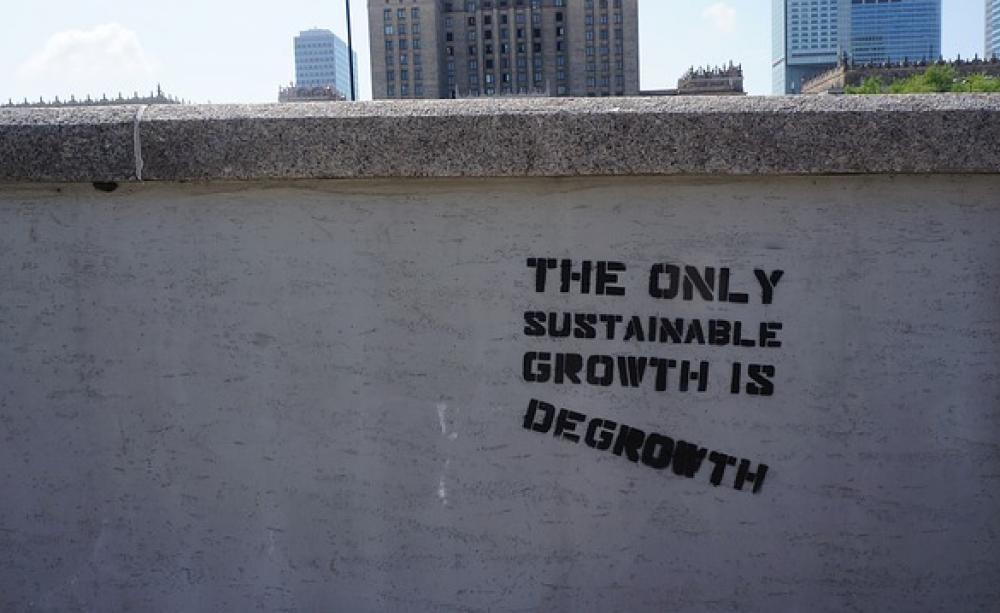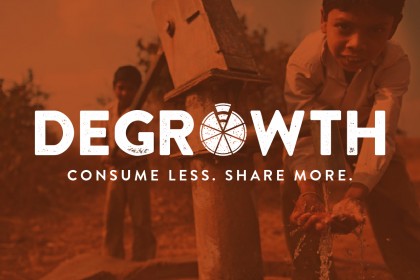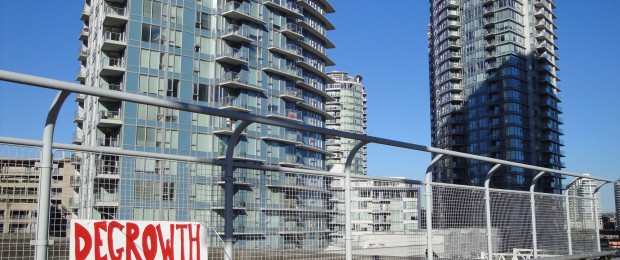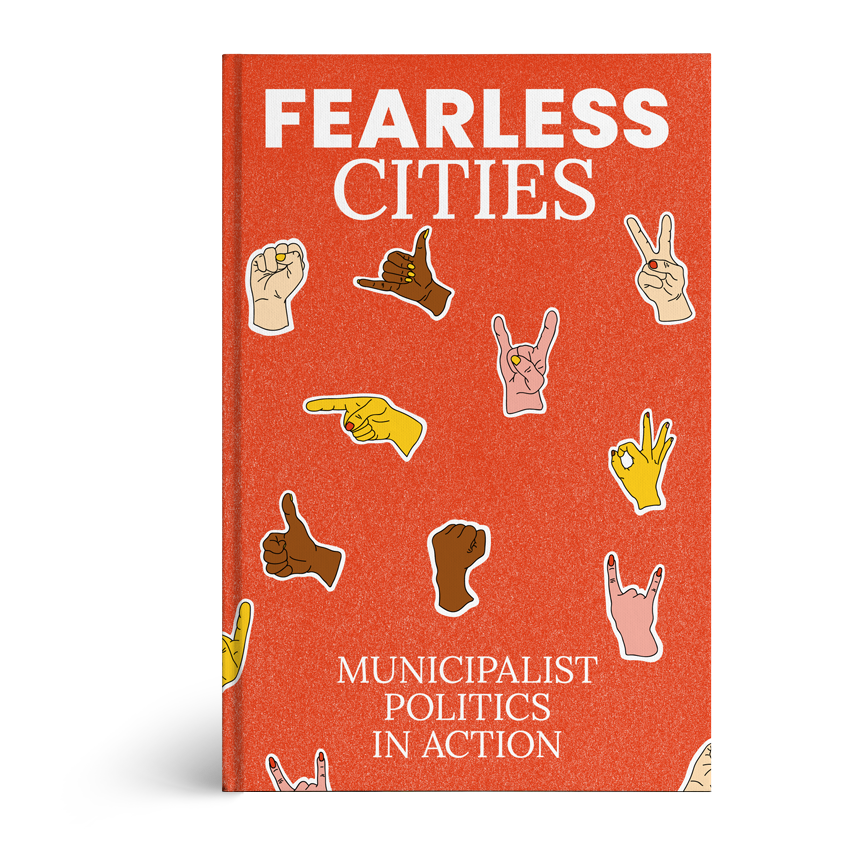Degrowth Municipalism could change the world
A panel discussion about Degrowth and Municipalism, at the international municipalist summit Fearless Cities in Sheffield November 2-3rd, explored the overlaps between the two movements. Degrowth and municipalism are not only mutually supportive, but need each other to make way for a socially just and ecologically sound future.
Degrowth challenges the widespread doctrine that economic growth ensures our collective well-being. Instead, it argues that in order to provide a good life for all, we need economic contraction alongside redistributing resources more equitably, as infinite growth is impossible on a finite world. Municipalism is about people collectively imagining our lives, acting locally and thinking globally, trying to live beyond crisis and structural oppression – many ways to co-create a good life for all. In a world dominated by the crises of capitalism and nation states, both ideas are gaining momentum. Both are movement multipliers – spaces where political causes intersect.
“New municipalism” and Fearless Cities
Fearless Cities summits are international spaces to explore, elevate and skill-share how people can change the world acting locally through municipalism. They have converged from New York to Naples, from Warsaw to Valparaíso in Chile. Fearless Cities began in Barcelona in 2017, two years after social movements there combined and won the city hall elections.

I was one of the co-organisers of Fearless Cities in Sheffield, organising Municipalist Futures, one of the four strands alongside Democracy, Care and Commons. On the first weekend of November, the summit was also organised by Opus Independents, Research for Action, Citizen’s Network and CareFull. On these isles there are many social movements building local power and autonomy – yet few movements that describe themselves as “municipalist”. A key aim of the summit was to show how through municipalism social movements can be greater than the sum of their parts. In total, around 400 people took part in workshops, panel discussions, meetings and assemblies held in the University of Sheffield.
In 2015, social movements combined into municipalist platforms and won local elections in Barcelona, Madrid and many other cities across the Spanish state. The Fearless Cities Summits, founded by Barcelona en Comu, were a medium that put this “New Municipalism” higher up the international agenda. The first summit was initiated by Barcelona en Comu. Although there are many examples of municipalism before the Spanish wave of 2015. European examples include the urban commons of Naples, more distant examples such as the autonomous democratic confederalism in north-east Syria.
Barcelona en Comu governed from 2015 to 2023. Transformations to their city included actively reducing tourist numbers; fining property speculators for vacant properties; creating superblocks, areas where pedestrians and active transport are prioritised and cars are severely restricted; and in 2017, creating Barcelona Energia, a municipal energy supply that provides renewable and affordable energy beyond the profit motive dominating Spanish energy companies.
So if that’s new municipalism, can we speak of an ‘old municipalism’? Archaeological evidence suggests that many of the first cities were co-created in a non-hierarchical way, with people often living in far more equitable material conditions. Examples include Çatalhöyük (7,400-5,900bce) in present-day Turkey and Taljanky and other nearby cities in present-day Ukraine (4,100-3,300bce).
From the earliest known times to the present day, there are many other examples of municipalism.
Sasha Josette of the Working Class Climate Alliance spoke at Fearless Cities opening plenary about how her many-times-great-grandmothers in Kerala organised resistance to British imperialism using strategies and means akin to municipalism. These were women-led local power networks – even if they were not defined as such.
All this points to a tension about municipalism. For time, people have collectively organised locally. But today there are few examples of people doing it. Municipalism is an exception to the rule of most people live under systemic domination of corporations and nation-states. Degrowth faces a similar conundrum. David Graeber and David Wengrow point out that early evidence for it goes back to Taljanky and similar local cities in Ukraine in the 4th millennium bce, where their “ecological footprint was minimal, likely including a conscious effort “to avoid large-scale deforestation.” For more on this see here.
Yet even if it is an idea as old as time and consistent with the laws of physics, degrowth as a political idea is considered heretical. Like municipalism, both are seen beyond the scope of political possibility.
The Right to the City and Degrowth
One early inspiring impact of Fearless Cities was the large number of applications we received in response to the open call to hold workshops or sessions at the summit. The Municipalist Futures strand was largely developed by bringing together the contributions of these participants in meetings, workshops and discussion panels. This included the panel entitled: The Right to the City and Degrowth. The right to the city – the idea – is a core horizon of municipalism. It is about meeting the material needs of all people and giving them equal access to the city, resources and its space. Furthermore, it moves up Maslow’s hierarchy of needs, asserting that the city belongs to all of us, that we must shape our cities together in a democratic way and enable autonomy.
Robbie Gillett was one of the five speakers. He works for Adfree Cities, a network of local organisations that opposes the outdoor advertising that has become ubiquitous in our cities, especially on public transport. This corporate propaganda is the opposite of the right to the city, where corporations are effectively able to shit in our heads and promote hyper-consumption, which ties in seamlessly with degrowth.

Ellie Harrison of Get Glasgow Moving also spoke, this movement aims to make public transport affordable, decent and publicly owned. Similar to anti-advertising, there are island-wide urban campaigns to municipalize bus services. These have been successful in Manchester and Liverpool, among others.
Those in Strathclyde or South Yorkshire can input into ongoing efforts, to reimagine a more inclusive transport cities that moves away from the huge ecological impact of private transport.
Giulia Massolino of Adesso Trieste was another speaker. This municipalist movement in northern Italy that has councillors, including Giulia, in opposition on the city council. Adesso Trieste (Trieste Now) is led by participatory processes, for instance crowd-sourcing its electoral platform before elections. Or participatory walks through the city that create dynamic spaces for political debate and imagination. As mentioned about Barcelona en Comu, winning city government power enables social movements to take real action to reduce a city’s ecological footprint. Giulia explained how this is also possible in opposition at city hall, by working with other parties to establish active transportation routes, for example, or to regreen a post-industrialised area of the city through a participatory laboratory.
So how does the emerging degrowth movement relate to municipalism? Krisztina Campbell spoke from Degrowth London spoke about this. This is one of many degrowth movements emerging around the world. She pointed out numerous overlaps between degrowth and municipalism and explained how the dominant mindset need to move beyond neoclassical economic thinking that looks at states like households budget, a circular thinking that limits scope. Krisztina also talked about how degrowth as an emerging idea is predominantly discussed by academics, with more focus on theory compared to practical action. It wasn’t that long ago in these isles municipalism was only really discussed in similar scholarly circles.
Lucas Snaije responded to a top FAQ for municipalists: “This all sounds great, but how does local action solve global crises?”. He spoke on behalf of the Fossil Fuel Non-Profileration Treaty. This movement is driven by nations and communities in the Majority World (aka Global South). Signatories commit to end the use of fossil fuels, similar to previous treaties to end the proliferation of nuclear weapons and landmines. This treaty is an example of municipalities – alongside nations that are extremely vulnerable to the climate meltdown that they did not cause – forming a translocal alliance for degrowth. It blazes a trail towards small states, cities, towns and villages being key actors against global systemic crisis.
Fighting corporate advertising, greening community transportation systems, building translocal alliances: these were just some of the practical ways we can act at the local level to move towards a degrowth future. They answer the issue of how the degrowth movement can move from ideas to action. In addition, there were many other examples, both in the panel – and throughout the summit – of how municipalists and/or urban social movements are pushing us towards degrowth – even if they are not (yet) doing so in the language of degrowth.

Further examples of how muncipalist-esque projects pushing degrowth include rebuilding a food system around local buyer’s cooperatives on working class streets, creating local assemblies to build counter-power, and networking and strengthening the solidarity economy. All of these examples come from these isles. I say “municipalist-esque” here because while many of these movements do not yet identify with that label. But for those who did, this is autonomous municipalism – that is, they see the local as the core arena of politics instead of the state (like platform municipalism), but instead of social movements wanting to take over city hall – this is about building power autonomously.
Discussions across the summit emphasised the extra difficulties the dysfunctional electoral system – especially in England – and dominance of big parties place for platform municipalists, Flatpack Democracy in rural areas of mainly southern England is a notable exception. This means autonomous municipalism offers more opportunities here. The urban commons of Naples are an example of autonomous muncipalism: former grands abandoned buildings run as social centres, cultural spaces and mutual aid spaces by weekly assemblies.
Degrowth Municipalism
Why does municipalism need degrowth? Adjusting a just transition phrase, simply: There is no liberated and socially just city on a dead planet. But the potential symbiosis goes deeper into the framework where beliefs are turned into supposed facts. To get to this other future, Degrowth Municipalism moves us not only beyond the capitalist state, but also its substantiating myths.
Many people would consider a future without economic growth unimaginable. But many of these people would also agree that constant economic growth is impossible on a finite planet. There is a conflict between the laws of physics and the man-made “laws of politics”. Municipalist action can help to overcome this cognitive dissonance. At Fearless Cities, the discussion touched on how many people you meet on the street – would resist terms like degrowth or anti-capitalism. This is despite the fact that these same people are totally against public advertising or the influence of corporations on our cities and lives. By shifting the focus of politics beyond the nation-state, by doing things in practical and tangible ways, municipalism opens up a space for new thinking. It is easier to get head around degrowth, seeing it in action near you and thinking in a space without the baggage of the capitalist nation-state.

Cities were crucial to the development of the our human journey long before anyone started constructing capitalism, economic growth, structural oppression and the colonial version of the nation-state. Through Degrowth Municipalism it is possible for cities to continue to play an seminal role going forward, as these contemporary considerations fade into history.

I have never heard of you. Neither have any of my colleagues.
I make the above comment, not as any kind of criticism. I’m sure you have not heard of us in the direct democracy movement, but rather that as we are working in very similar areas and that information about what we respectively are doing is not passing between us, much less the general population, there is still very much wrong in what should be a much wider public debate.
I do not have any contact details for you or any of your colleagues but you now have mine. If you think that we have something to gain by future co-operation and communication, I would be pleased to hear from you. I look forward to it.
You can find out more about the Fearless Cities movement by downloading its guide here (https://www.fearlesscities.com/en/book) and join its network from the same site.
I am surprised the guy wrote the article if he is so against advertising. Don’t shit in my head, Steve!
All well and good but I suggest that the very concept of a ‘city’, a place that separates people from ‘nature’, is obsolete. A city is a centre of power and wealth that exists by parasitising, exploiting and despoiling the rural, non-city it depends on. It is the focus of economic ‘growth’ and centralised power, and it destroys planet and people alike. We no longer need cities. We now have technologies that allow people and nature to coexist everywhere, produce much of what they need locally. My grandfather was a pioneer of the Garden City movement in the early 20th c. That was then. Now it’s time to turn the idea on its head and start planning for a self-sustaining, rural landscape with human scale interconnected communities and semicircular economies. The high rise block, the ‘machine for living in’ is so 20th c. It belongs in a 1950s Marvel comic with Musk’s mad dreams of space travel.
A city (according to its Latin root) is just a social body united by law. I believe the term was coined by Cicero to translate the Greek term ‘polis’, which named what we would call a ‘state’. It’s got fuck all to do with the difference between urban and rural environments.
It would be good to go back to this republican concept of the state as any social body untied by law – a ‘city’ or ‘polity’ – rather than as a ‘nation’ (a social body united by race of culture) or as a ‘realm’ (a social body untied by the power of a ruler).
Whatever its origins ‘city’ has I think for most people urban connotations; the idea of trade, a store of wealth and power (traditonally surrounded by walls)and the idea of ‘citizenship’ perceived as superior to the kindred / tribal based ‘uncivilised’ rural areas.
Still I love the fact the the ‘city’ in my postal address is Achnasheen, a place with a cafe and a railway station, but no shops or post office.
City status in the UK can be associated with having a cathedral or a university, a particular form of local government, or having a large population. Whatever the popular use of the term ‘city’, in formal terms UK city status is granted by the monarch, on the advice of ministers.
That said, the classical city, as a form of government, is the most pertinent in relation to the subject of this article – municipalism.
A city is simply a substantial urban area. The characteristics you mention just indicate that it has a higher status than a mere town.
But my point is that it’s an urban area. A concentration of people, wealth and power that is not self sufficient but depends for its survival on a ‘hinterland’. In other words it is not rural.
Technology, including the internet, has rendered centralisation of wealth and power into urban areas obsolete.
And this means that not only the ‘city’ but the centralised social, economic, and ecological relationships it represents, are all obsolete too. We can now live in and with nature and can cosign the concrete jungle to the dustbin of history.
Cities are remarkably dependent and vulnerable. The university, the bank, the church, the administration, can be delivered from and accessed anywhere. And to
live in relative freedom, health, and community, with the ability to
produce essentials locally and build semi-circular interdependent sustainable economies, the rural area no longer needs the city at all.
Happy Christmas!
‘A city is simply a substantial urban area.’
Yes; that’s the popular misconception. I’m just saying that the republican conception, of the city as a municipality (any community with corporate privileges of self-government), is a better one.
‘Misconception’? Well, it’s just one of a number of possible definitions. I agree that traditionally a city should be self-governing but in practice this is often not the case, and the title is merely honorific. Inverness for example has no city council, even if the Highland Council sees itself as one. There is no actual ‘municipality’ there because the Council covers a third of Scotland, including mountainous, sparsely populated very rural areas.
So to avoid misunderstanding, I don’t personally think the concept of ‘municipality’ is very helpful or relevant to where I live. However I do support the idea of smaller, more decentralised, democratic, identifiable and representative (and empowered) authorities, in both urban and rural areas.
Yes; you can define a ‘city’ any way you like. But some definitions are more useful than others. Defining it as a substantial urban area, rather than any social body united by law, regardless of size, is practically useless; it does nothing to promote municipalism in Scotland.
As Steve says in his article: ‘Municipalism is about people collectively imagining our lives, acting locally and thinking globally, trying to… co-create a good life for all.’ This can be done just as well in a rural setting as it can be in an urban setting; a network of small farming communities could just as easily form a municipality as a concentrated urban community.